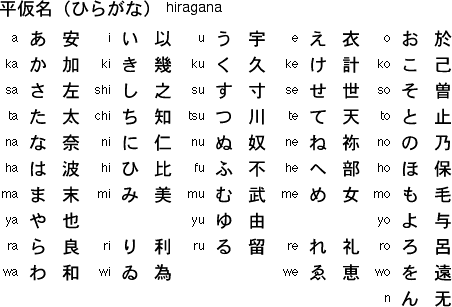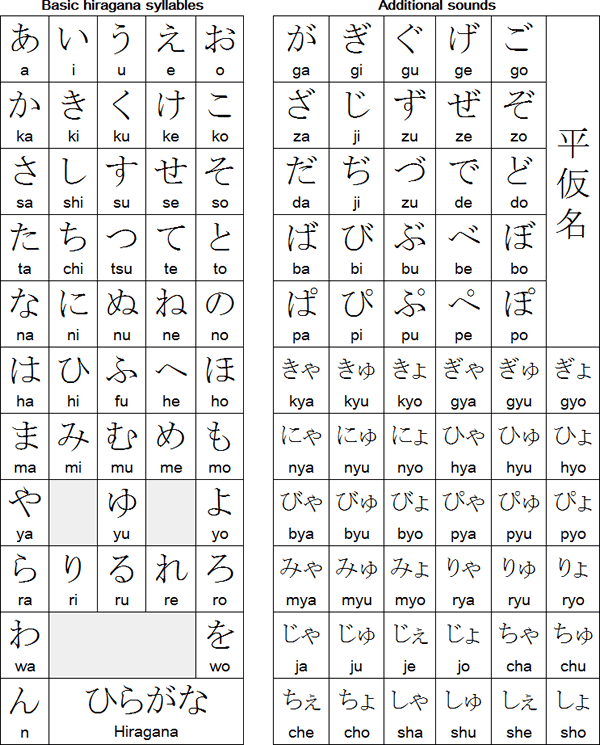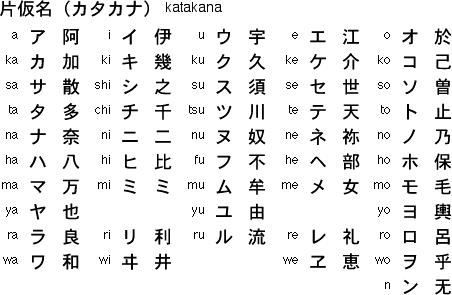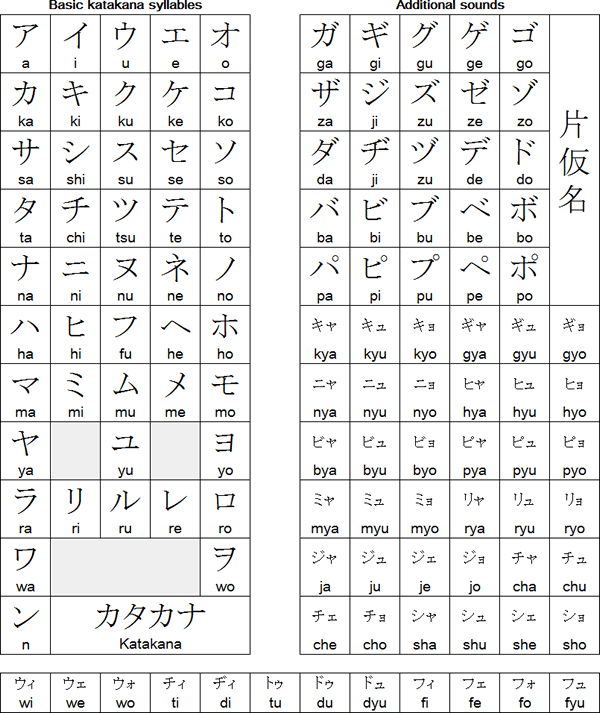- Home »
- LEARN HOW TO SPEAK JAPANESE
// Posted by :Unknown
// On :Sunday, 1 July 2012
JAPANESE HIRAGANA
Hiragana syllables developed from Chinese characters. Hiragana were originally called onnade or 'woman's hand' as were used mainly by women - men wrote in Kanji and Katakana. By the 10th century, hiragana were used by everybody. The Word Hiragana means "ordinary syllabic script"
Hiragana and the Kanji from which they developed.
In each column the romaji appears on the left, the hiragana symbols in the middle and the Kanji from which they developed on the right. There is some dispute about the origins of some of the symbols

Hiragana syllabary (平仮名 / ひらがな)
The symbols on the right are basic Hiragana syllabary in the order they appear in dictionaries and indices. Additional Sounds (the symbols on the right) are represented by diacritics and combinations of symbols.

Long Vowels

Furigana in action
The Furigana in the following text are the small hiragana above or beside the Kanji.
Horizontal text with Hiragana

This text in Hiragana

This text in standard Japanese (without furigana)

JAPANESE KATAKANA
The Katakana syllabary was derived from abbreviated Chinese characters used by Buddhist monks to indicate the correct pronunciations of Chinese texts in the 9th Century. At first there were many different to represent one syllable of spoken Japanese, but over the years the system was streamlined. By the 14th Century, there was a more or less one-to-one correspondence between spoken and written syllables.
Katakana and the Kanji from which they developed
In each column the romaji appears on the left, the Katakana symbols in the middle and the Kanji from which the symbols were derived on the right.

Katakana syllabary (片仮名 / カタカナ)
The symbols on the right are the basic Katakana syllabary in the order they appear in dictionaries and indices .Additional sounds (the symbols on the right) are represented by diacritics and combinations of symbols.

Long Vowels

Sample text in Katakana

The text in standard Japanese

JAPANESE KANJI
Between 5,000 and 10,000 characters, or Kanji, are used in written Japanese. In 1981 in an effort to make it easier to read and write Japanese, the Japanese government introduced the 常用漢字表 (jōyō kanji hyō) or the "List of Chinese Characters for General Use", which includes 1,945 regular characters, plus additional characters used for people's names (人名用漢字 - jinmeiyô-kanji). This is based on the list of 1,850 regular use Kanji (当用漢字 tôyô kanji) published in 1946. In 2010 an additional 196 commonly-used Kanji were added to the jōyō kanji taking the total to 2,136.
Newspapers and other media and publications use mainly jōyō kanji and provide furigana (reading in kana) for non-jōyō kanji. Japanese children are expected to know all of the jōyō kanji by the end of high school but to read specialist publications and ordinary literature, they need to know another two or three thousand Kanji.
The word Kanji is the Japanese version of the Chinese word hànzì, which means "Han characters". Han refers to the Han Dynasty (206BC - 220AD) and is the name used by the Chinese for themselves.
When the Japanese adopted Chinese characters to write the Japanese language they also borrowed many Chinese words. Today about half the vocabulary of Japanese comes from Chinese and Japanese Kanji are use to represent both Sino-Japanese words and native Japanese words with the same meaning.
For example, the native Japanese word for water is mizu while the Sino-Japanese word is sui. Both are written with the same character. The former is known as the kun yomi (Japanese reading) of the character while the latter is known as the on yomi (Chinese reading) of the character.


The general rule is that when a kanji appears on its own, it is given the kun yomi, but when two or more kanji appear together, they are given the on yomi. There are, of course, many exceptions to this rule. For example it is sometimes difficult to work out how to pronounce people's names because some of the kanji used for names have non-standard pronunciations.
Some kanji have multiple on yomi and kun yomi (the first three readings are on yomi, the last three are kun yomi):
Multiple on yomi are often a result of borrowing words over a period of many centuries, during which Chinese pronunciation changed, and also borrowing words from different varieties of Chinese.
Some of the kanji have been simplified, although not always in the same way as characters have been simplified in China:

There are also a number of characters, kokuji (national characters) which were invented in Japan.

BASIC JAPANESE VOCABULARY WORDS
Animals - Doubutsu (どうぶつ)
- Bear - Kuma (くま)
- Bird - Tori (とり)
- Cat - Neko (ねこ)
- Cow - Ushi (うし)
- Crane - Tsuru (つる)
- Dog - Inu (いぬ)
- Dolphin - Iruka (いるか)
- Duck, Domestic - Ahiru (あひる)
- Dick, Wild - Kamo (かも)
- Elephant - Zhou (ぞう)
- Fish - Sakana (さかな)
- Fox - Kitsune (きつね)
- Frog - Kaeru (かえる)
- Giraffe - Kirin (きりん)
- Goat - Yagi (やぎ)
- Goose - Gachou (がちょう)
- Horse - Uma (うま)
- Kitten - Koneko (こねこ)
- Lion - Raion (ライオン)
- Monkey - Saru (さる)
- Mouse - Nezumi (ねずみ)
- Octopus - Tako (たこ)
- Pig - Buta (ぶた)
- Racoon - Araiguna (あらいぐま)
- Racoon, Dog - Tanuki (たぬき)
- Rat - Oonezu (おおねずみ)
- Seal - Azarashi (あざらし)
- Shark - Same (さめ)
- Sheep - hitsuji (ひつじ)
- Snake - Hebi (へび)
- Squid - Ika (いか)
- Squirrel - Risu (りす)
- Tiger - Tora (とら)
- Turtle - Kame (かめ)
- Whale - Kujira (くじら)
- Wolf - Ookami (おおかみ)
- Zebra - Shimauma (しまうま)
- Dollar - Doru (ドル)
- Us Dollar - Amerika Doru (アメリカドル)
- Yen - En (えん)
- Yuan (China) - (jimmin) Gen ((じんみん)げん)
- Canadian Dollar - Kanada Doru (カナダドル)
- Franc (Switzerland) - furan (フラン)
- New Zealand Dollar - Nyuujirando Doru (ニュージーランドドル)
- Austrailian Dollar - Oosutoraria Doru (オーストラリアドル)
- Pound (England) - Pondo (ポンド)
- Rouble (Russia) - Ruuburu (ルーブル)
- Won (Korea) - Won (ウォン)
- Euro - Yuuro (ユーロ)
- Peso - Peso (ペソ)
Body Parts - Bodipatsu (ボディパーツ)
- Body - Karada (からだ)
- Arm - Ude (うで)
- Back - Senaka (せなか)
- Bladder - Boukou (ぼうこう)
- Blood - Chi/Ketsueki (ち / けつえき)
- Bone - Hone (ほね)
- Brain - Nou (のう)
- Cheek - Hoo (ほう)
- Chin - Ago (あご)
- Ears - Mimi (みみ)
- Elbow - Hiji (ひじ)
- Eyebrows - Mayuge (まゆげ)
- Eyelash - Matsuge (まつげ)
- Eyes - Me (め)
- Face - Kao (かお)
- Fingers - Yubi (ゆび)
- Foot - Ashi (あし)
- Forehead - Hitai (ひたい)
- Hair - Kaminoke (かみのけ)
- Hands - Te (て)
- Head - Atama (あたま)
- Heart - Shinzou (しんぞう)
- Intestines - Chou (ちょう)
- Kidney - Jinzou (じんぞう)
- Knees - Hiza (ひざ)
- Legs - Ashi (あし)
- Lips - Kuchibiru (くちびる)
- Liver - Kanzou (かんぞう)
- Mouth - Kuchi (くち)
- Muscle - Kinniku (きんにく)
- Mustache/Beard - Hige (ひげ)
- Neck - Kubi (くび)
- Nose - Hana (はな)
- Shoulder - Kata (かた)
- Stomach - Onaka/Ki (おなか / い)
- Teeth - Ha (は)
- Throat - Nodo (のど)
- Toes - Ashiyubi (あしゆび)
- Tongue - Shita (した)
Colors - Iro (色)
- Red - Aka (あか)
- Yellow - Kiiro (きいろ)
- Blue - Ao (あお)
- Green - Midori Iro (みどりいろ)
- Purple - Murasaki Iro (むらさきいろ)
- Orange - Orenji Iro (オレンジいろ)
- Peach - Hada Iro (はだいろ)
- Pink - Pinku/Momo Iro (ピンク / ももいろ)
- Brown - Cha Iro (ちゃいろ)
- Black - Kuro (くろ)
- White - Shiro (しろ)
- Gray - Nezumi Iro/Hai Iro (ねずみいろ / はいいろ)
- Light Blue - Mizu Iro (みずいろ)
- Yellow Green - Kimidori Iro (きみどりいろ)
Days Of The Week - Yobi (曜日)
- Sunday - Nichiyobi (にちようび)
- Monday - Getsuyobi (げつようび)
- Tuesday - Kayoubi (かようび)
- Wednesday - Suiyoubi (すいようび)
- Thurday - Mokuyoubi (もくようび)
- Friday - Kinyoubi (きんようび)
- Saturday - Doyoubi (どようび)
- Weekday - Heijitsu (へいじつ)
- Weekend - Shuumatsu (しゅうまつ)
- Mother - Okaasan (お母さん)
- Father - Otousan (お父さん)
- Older Sister - Oneesan (お姉さん)
- Older Brother - Oniisan (お兄さん)
- Younger Sister - Imouto (妹)
- Younger Brother - Otouto(弟)
- Daughter - Musume (娘)
- Son - Musuko (息子)
- Aunt - Obasan (叔母さん)
- Uncle - Ojisan (おじさん)
- Niece - Meisan (メイさん)
- Nephew - Oisan (大井さん)
- Cousin - Itoko (いとこ)
- Grandfather - Ojiisan (おじいさん)
- Grandmother - Obaasan (おばあさん)
- Grandchild - Mago (孫)
- Siblings - Kyoudai (兄弟)
Months - Kagetsu (か月)
- January - Ichigatsu (いちがつ)
- February - Nigatsu (にがつ)
- March - Sangatsu (さんがつ)
- April - Shigatsu (しがつ)
- May - Gogatsu (ごがつ)
- June - Rokugatsu (ろくがつ)
- July - Shicigatsu (しちがつ)
- August - Hachigatsu (はちがつ)
- September - Kugatsu (くがつ)
- October - Juugatsu (じゅうがつ)
- November - Juuichigatsu (じゅういちがつ)
- December - Juunigatsu (じゅうにがつ)
- Fruit - Kudamono (くだもの)
- Orange - Orenji (オレンジ)
- Strawberry - Ichigo (いちご)
- Peach - Momo (もも)
- Grapes - Budou (ぶどう)
- Fig - Ichijiku (いちじく)
- Lemon - Remon (レモン)
- Cherry - Sakuranbo (さくらんぼ)
- Watermelon - Suika (すいか)
- Apple - Ringo (りんご)
- Banana - Banana (バナナ)
- Vegetables - Yasai (やさい)
- Carrot - Ninjin (にんじん)
- Potato - Jagaimo (じゃかいも)
- Tomato - Tomato (とまと)
- Spinach - Hourensou (ほうれんそう)
- Onion - Tamanegi (たまねぎ)
- Pumpkin - Kabocha (かぼちゃ)
- Green Pepper - Piiman (ぴいまん)
- Cucumber - Kyuuri (きゅうり)
- Garlic - Ninniku (にんにく)
- Beans - Mame (まめ)
- Green Onion - Negi (ねぎ)
- Eggplant - Nasu (なす)
- Meat - Niku (にく)
- Beef - Gyuuniku (ぎゅうにく)
- Chicken - Toriniku/ Chikin (とりにく / チキン)
- Turkey - Butaniku (しちめんちょう)
- Lamb - Hitsujiniku (ひつじにく)
- Ham - Hamu (ハム)
- Beverages - Nomimono (のみもの)
- Cola - Koora (コーラ)
- Water - Mizu (みず)
- Green Tea - Ocha (ちゃ)
- Milk - Gyuunyuu (ぎゅうにゅう)
- Coffee - Kohii (コーヒー)
- Spices - Choumiryoo (ちょうみりょう)
- Oil - Abura (あぶら)
- Ketchup - Ketchappu (ケチャップ)
- Pepper - Koshou (こしょう)
- Vinegar - Su (す)
- Soy Sauce - Shouyu (しょうゆ)
- Horseradish - Wasabi (わさび)
- Mayonnaise - Mayoneezu (マヨネーズ)
- Salt - Shio (しお)
- Sugar - Satou (さとう)
- Yellow Mustard - Karashi (からし)
- Egg - Tamago (たまご)
- Fish - Sakana (さかな)
- Cake - Keeki (ケーキ)
- Rice (Cooked) - Gohan (ごはん)
- Rice (Uncooked) - Kome (こめ)
- Bread - Pan (パン)
Greetings - Aisatsu (あいさつ)
- Good morning (Polite) - Ohayo Gozaimasu (おはようございます)
- Good morning - Ohayo (おはよう)
- Good afternoon/Hello - Konnichiwa (こんにちは)
- Good evening - Konbanwa (こんばんは)
- Good night (Polite) - Oyasumi Nasai (おやすみなさい)
- Good night - Oyasumi (おやすみ)
- Good bye - Sayonara (さようなら)
- Welcome - Yokoso (ようこそ)
- Excuse me/Sorry - Sumimasen (すみません)
- Forgive me/Sorry - Gomen Nasai (ごめん〜なさい)
- Thank you (Polite) - Arigato Gozaimasu (ありがとうございます)
- Thank you - Arigato (ありがとう)
- Thank you very much (Polite) - Domo Arigato (どうもありがとう)
- Thank you very much - Domo (どうも)
- You are welcome - Do Itashimashita (どういたしまして)
- I am home - Tadaima (唯今)
- Welcome home - Okaeri Nasai (おかえり〜なさい)
- I shall receive now - Itadakimasu (いただきます)
- How are you - Ogenki Desu Ka (お元気ですか)
- I am fine - Genki Desu (元気です)
Clothes - Fuku (服)
- Coat - Kooto (コート)
- Dress - Doresu (ドレス)
- Pants - Zubon (ズボン)
- Shirts - Shatsu (シャツ)
- Skirt - Sukaato (スカート)
- Suit - Suutsu (スーツ)
- Sweater - Seetaa (セーター)
- Jacket - Jaketto (ジャケット)
- T-Shirts - T-Shatsu (Tシャツ)
- Underwear - Shitagi (下着)
Weather - Tenki (天気)
- Clear Skies - Hare (はれ)
- Cloud - Kumo (くも)
- Cloudy - Kumori (くもり)
- Cold - Samui (さむい)
- Cool - Suzushi (すずしい)
- Fog - Kiri (きり )
- Hot - Atsui (あつい)
- Humid - Mushiatsui (むしあつい )
- Humidity - Shiike (しっけ)
- Ice - Koori (こおり)
- Lightning - Kaminari (かみなり)
- Rain - Ame (あめ)
- Rainy Season - Tsuyu (つゆ)
- Snow - Yuki (ゆき)
- Sun - Taiyou (たいよう)
- Thunder - Kaminari (かみなり)
- To Clear - Haremasu (はれます)
- To Rain - Ame Ga Furimasu (あめがふります)
- To Snow - Yuki Ga Furimasu (ゆきがふります)
- Typhoon - Taifuu (たいふう)
- Warm - Atatakai (あたたかい)
- Wind - Kaze (かぜ)
- Attic - Yaneura (やねうら)
- Toilet - Toire (トイレ)
- Bathtub - Ofuro (おふろ)
- Bedroom - Shinshitsu (しんしつ)
- Ceiling - Tenjou (てんじょう)
- Door - Doa (ドア)
- Entrance - Genkan (げんかん)
- Floor - Yuka (ゆか)
- Garden - Niwa (にわ)
- House - Uchi (うち)
- Kitchen - Daidokoro (だいどころ)
- Living Room - Ima (いま)
- Room - Heya (へや)
- Wall - Kabe (かべ)
- Window - Mado (まど)
- Chair - Isu (いす)
- Couch - Sofaa (ソファー)
- Desk - Tsukue (つくえ)
- Furniture - Kagu (かぐ)
- Mirror - Kagami (かがみ)
- Refrigerator - Reizuoko (れいぞうこ)
- Table - Teeburu (テーブル)
- Vacuum Cleaner - Soujiki (そうじき)
- Washer - Sentakuki (せんたくき)
GRAMMAR LESSON IN JAPANESE
Lesson 1: It's a.... - Desu (です)
This simplest structure in Japanese is "...desu", structure. Desu is usually pronounced 'dess'as the u become silent. Simply put, Desu mean "It is", "Those are" or "I am"___ desu. It's___.
Note: In Japanese, Cat = Neko, Dog = Inu
There usually no difference between plural and singular things in Japanese. To distinguish what is being said, one must rely on text or add an adjective to describe how many dogs and cats or whatever you have.
Neko desu ka : Is it a cat?
Inu desu ka : Is it a dog?
John-san desu ka : Are you John? or Is it John?
Note: that the suffix 'san' was added to the end of John when it became a question. This is because you are refering to someone else, rather than yourself. It is considered polite to add -san to people's names other than your own. Be very careful not to add it to the end of your own name though, as it is considered very rude and unusual.
To say "Its is not a cat" or "I am not John". You have to use dewa arimasen or janai desu. Either from means the same thing, but dewa arimasen (でわありません). is more formal.
Neko dewa arimasen : It's not a cat.
Neko janai desu : It's not a cat
Inu dewa arimasen : It's not a dog
Inu janai desu : It's not a dog
John-san janai desu : I'm not John
Note: In the example above, you are not John, therefore refering to to him with -san is ok. If someone ask you "Is it a cat?" you can respond with yes - hai (はい) or no - iie (ノー)
Neko desu ka? : Is it a cat?Hai, neko desu : Yes, it is a catiie, neko dewa arimasen : No, it's not a cat
If you don't know something is, you can point to it and ask "Nan desu ka?" (何ですか)
Nan means 'what', so the sentence means "What is it?" Do not use nan to refer people. It is very rude.
Examples:-
Nan desu ka? : What is it?
Inu desu : It's a dog
Nan desu ka? : -----
Neko desu : It's a cat
Lesson 1 Vocabulary
-san ; polite ending for other people's name
desu : It's a...
janai desu : It's not a....
dewa arimasen : ------
Hai : Yes
iie : No
Nan : what
ka ; particle added to the end of a sentence to make it a question
Neko : Cat
Inu : Dog
